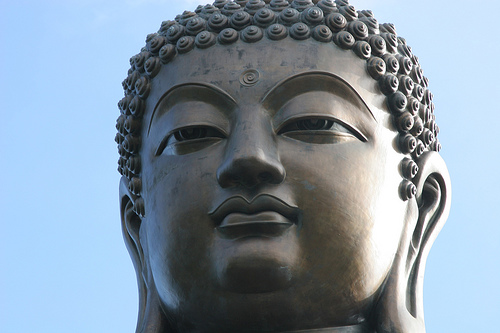“Self knowledge is the beginning of self improvement.” –Spanish Proverb
As you may remember from my post on Monday, I recently received an invitation to attend a live taping of an Oprah’s Life Class webcast.
I knew it was an interactive self-help experience, involving questions from the audience and people who Skyped in. It sounded right up my alley.
Before the taping, a woman led me and other bloggers to a reserved row and then gave us network information so we could tweet or Facebook from our iPads, iPhones, or laptops.
I only own a laptop, and I didn’t bring it with me. Particularly because I write for a living, the last thing I wanted to do was distract myself from this experience with a glaring screen. In that moment I felt conflicted: It was obvious I was invited to share on the spot, and I was not delivering.
Since the first webcast guest was Eckhart Tolle—who wrote the book on being present—I found this conundrum ironic.
Then I realized this is the challenge of our time. We’re fortunate to have tools that connect us and enable us to spread messages far and wide; and yet we always have to balance our instinct to share with our need to fully focus on what’s in front of us.
I realize there isn’t a one-size-fits-all solution for this, as there rarely is. I suspect it really comes down to knowing ourselves, and understanding why we’re doing what we’re doing.
According to Doug Firebraugh of SocialMediaBlogster.com, there are seven psychological needs we may be looking to meet when we log onto a social media site: acknowledgment, attention, approval, appreciation, acclaim, assurance, and inclusion.
We’re wired to want to be seen, and it’s tempting to chase that instant fix of validation or connection. That’s not to say these are the only motivations, but they’re potential driving forces. If we can check ourselves to understand why we’re tempted to share, we’ll be better equipped to meet our needs beyond the world of tweets and updates.
Sharing can be a beautiful thing if we’re genuinely inspired to do it. But it’s up to us to know ourselves, so that we connect from a place of wholeness, not from a place of lack.

Photo by Sarah Depper
About Lori Deschene
Lori Deschene is the founder of Tiny Buddha. She started the site after struggling with depression, bulimia, c-PTSD, and toxic shame so she could recycle her former pain into something useful and inspire others to do the same. You can find her books, including Tiny Buddha’s Gratitude Journal and Tiny Buddha’s Worry Journal, here and learn more about her eCourse, Recreate Your Life Story, if you’re ready to transform your life and become the person you want to be.
- Web |
- More Posts













 Though I run this site, it is not mine. It's ours. It's not about me. It's about us. Your stories and your wisdom are just as meaningful as mine.
Though I run this site, it is not mine. It's ours. It's not about me. It's about us. Your stories and your wisdom are just as meaningful as mine.
Wow, an audience with Eckhart! You are right – let’s be honest, while it feels good to have replies and likes on a social media site, on the whole it’s a short shallow buzz and it doesn’t make you happy – because often one is sharing for egotistical reasons. If you manage to quit looking for those “hits” you open up the possibility of genuine connection – which is much more profound.
I definitely have found the same. There have been times when I’ve checked my email or Facebook page repeatedly, looking for that fix of connection. Usually I feel much better if I get out and actually converse with someone. Then when I return, I’m better able to focus on writing or doing whatever needs to be done. I know longer feel this need to be acknowledged because I already feel connected.
I agree 100% im getting off the computer now to go hug my kids!
I also got to attend a taping in Chicago. I wrote about it here: http://liakeith.tumblr.com/post/11983359041/make-your-own-miracles Finding your site and reading your posts had a part in making my dreams come true. The energy that you experience at one of those life classes opens you up more. I was sitting with the Lifeclass Bloggers and it was interesting to watch them go, but I was like you, I needed to be fully present and take in everything. I have got insight after insight since then and it has been great for my writing. You did the right thing.
Thanks for sharing your post! I love what you wrote here: “What so many of us haven’t understood is that it is not enough to just ask for it to come; you have to go get it for yourself. It is not enough to just receive your blessings; once they are received, you have to pay it forward by sharing the energy of the blessing with others.”
In retrospect, I’m really glad I didn’t bring my laptop. I really enjoyed just being there and taking it all in.
Thanks for this one Lori!
I recently came out of a long-term relationship and have found there’s a lot more alone-time involved with being single and in a new city! I often feel the compulsion to share when I’m out and about and have tried to stop myself and just enjoy moments for myself instead of impulsively sharing.
I feel like sometimes we (well, I know I do) feel as though something didn’t really happen unless we’ve shared the experience with someone else, and I guess that’s where validation comes in. But my new mantra has become “I am worthy of having beautiful moments made just for me”.
I love that new mantra! Your comment reminded me of what Christopher McCandless discovered after isolating himself on the road. Right before he died alone, he wrote “True happiness is shared.” I think true happiness can be experienced both alone and with someone else, and that really it’s all about balance. He likely formed that conclusion because he had forsaken everyone and then died alone. If he had been less extreme, I’m sure he would have died with friends around him knowing happiness is enjoying some things just for you, and some things with the people you love.
that is so true! I have 2 blogs where I write, short stories, poems and other stuff and I feel I’m constantly looking for acknowledgment or approval for my writings. Why? I like them. Can’t that be enough?
And yes why can’t people enjoy what is happening right in front of them without ant sort off cell phone to watch through anymore? You see it at concerts where you only see bright lights from phones or people tweeting where they are or what they are doing. Having said that: I’m reading and posting this from my phone. 🙂 it can be usefull but just not all the time.
It does all come down to balance, huh? I have friends that are all about narrating their lives on their phones, and I don’t think that’s wrong, per se. It just doesn’t feel good to me. I love sharing after something happens–uploading pictures after an event or blogging about it, for example. But I personally don’t want to tweet while I’m doing something I enjoy. I just want to focus on doing it!
Very insightful post, Lori. I think I got addicted to online sharing when I started a LiveJournal blog – I’d blog multiple times a day, and I think that the feedback I’d get through comments was what drew me. I’m a weird combination of introvert and extrovert – I loved sharing my thoughts and ideas from behind the privacy and safety of my computer screen, where I could control my non-verbal cues and edit what I said until it was exactly what I meant.
Twitter and Facebook don’t allow me that ability to edit (more’s the pity!) yet I still often find my first response to something that happens when I’m alone is to share it on my social media network via my smartphone. And I may have to start leaving my phone in another room at night and use something else as my alarm clock if I can’t find any other way to quit my habit of rolling over and checking email the millisecond I wake up too…
I know all about the addictive quality of feedback! When I write something that generates dozens of comments, I feel proud of myself for starting a conversation that’s valuable to people. When I write something and it doesn’t generate much of a response, I oftentimes question the value of what I wrote–and if I’m not careful, that can translate into how I value myself in that moment. I have to frequently check myself to ensure I don’t get attached to that feedback. Sometimes it feels instinctive!
I could relate to being a weird combination of an introvert and an extrovert too. I also love that writing allows me to shape my words so that they are clear and specific. I love being able to communicate through written words–but I’m decidedly shier when it comes to video or speaking. I want to be able to make a difference–but I don’t love being the center of attention.
As for leaving your computer in another room, I highly recommend it! I just moved into a bigger apartment, so for the first time, I now have an office. I love that I can make that my laptop’s home. In the past, it would sit next to me on the couch at night, and I felt like I literally always had work at my side. It’s nice to create that separation–to know my life is more than the web. It makes it much easier for me to be present–which is ultimately when I am the happiest.
I think Doug Firebaugh hit the nail on the head when saying, ”there are seven psychological needs we may be looking to meet when we log onto a social media site: acknowledgment, attention, approval, appreciation, acclaim, assurance, and inclusion”.
Asking ourselves why we do what we do is fundamental in personal growth. In fact I tend to believe that those that don’t ask themselves those kinds of questions either “don’t get it” or don’t want to get it.
Like Oprah says…”to know better is to do better”.
Thanks for the great post Lori.
You’re most welcome. I love that quote by Oprah. Though for me, it misses a step–the choosing. There have been times when I’ve known better but I’ve chosen not to apply what I know. If I know better AND choose to do better, then anything is possible. =)
Lori, you’re right. Choice is a BIG element in personal growth.
love this article.
there is an expression. i have lots of friends-on my computer, tee hee